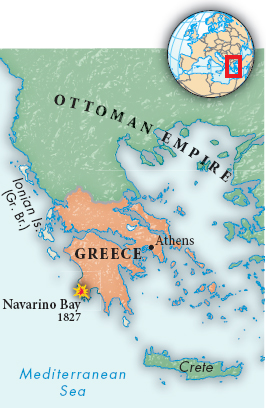Understanding Western Society
Printed Page 659
National Liberation in Greece
In spite of centuries of foreign rule by the Ottoman Turks, the Greeks had survived as a people, united by their language and the Greek Orthodox religion. In the early nineteenth century, the general growth of national aspirations inspired a desire for independence. This rising national movement led to the formation of secret societies and then to open revolt in 1821, led by Alexander Ypsilanti (ihp-

At first, the Great Powers opposed the revolution and refused to back Ypsilanti, primarily because they sought a stable Ottoman Empire as a bulwark against Russian interests in southeast Europe. Yet the Greek cause had powerful defenders. Educated Europeans and Americans cherished the culture of classical Greece; Russians admired the piety of their Orthodox brethren. Writers and artists, moved by the romantic impulse, responded enthusiastically to the Greek national struggle.
The Greeks battled the Ottomans while hoping for the support of European governments. In 1827, Great Britain, France, and Russia yielded to popular demands at home and directed Ottoman leaders to accept an armistice. When they refused, the navies of these three powers trapped the Ottoman fleet at Navarino and destroyed it. Russia then declared another of its periodic wars of expansion against the Ottomans. Great Britain, France, and Russia finally declared Greece independent in 1830 and installed a German prince as king of the new country in 1832. Despite this imposed regime, which left the Greek people restive, they had won their independence in a heroic war of liberation against a foreign empire.